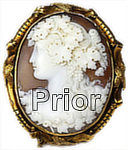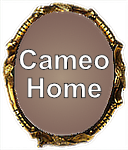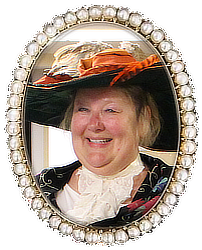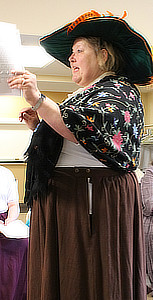
Whittier Cameo
Annie Adams Fields
Annie Adams Fields

|

|

|
 Played by Betty Moore
Played by Betty Moore
 My husband and I traveled in the same social circles as Whittier. We would see him in Holderness and
Campton, NH and at Marblehead, MA. He was such a retiring and shy man, and very set is his Quaker
ways. I remember inviting him to the theatre once and he lost his courage at the last minute, having
never been inside a theater before. John was compassionate towards those in need and convinced me
to give $500 towards a collection to benefit Lucy Larcom when she needed assistance.
Besides literary pursuits I was interested in social justice. I founded the Holly Tree Inn, a coffeehouse
where people could buy an inexpensive and nutritious meal, and the Lincoln Street Home, which was a
safe an inexpensive place for unmarried women to live.
As my husband's health failed, he encouraged me to meet one of his favorite writers, Sarah Orne Jewett.
He felt that we had many things in common and that we would be great friends even though I was
twenty years older. He was right; our friendship transcended age. She was one of my proteges as I was
in an influential position to help up and coming women writers. Along with Whittier, our mutual friends
included Willa Cather, Henry James, Rudyard Kipling, Oliver Wendail Holmes, Mark Twain, and Henry
Wadsworth Longfellow.
With the death of my husband in 1881, I became interested in Spiritualism. I felt that I would receive
much comfort if I could communicate with him. Many of my friends also believed in Spiritualism. With
millions of us believers in the US and Europe, we couldn't be wrong about being able to talk to our loved
ones on the other side, could we? But there were so many tours, trance lecturers, and camp meetings,
and not all of them were legitimate. But if Queen Victoria and Sir Arthur Conan Doyle can believe it is
true, so can I!
Whittier and I corresponded often. In one letter about his upcoming 82nd birthday, he wrote, "As life
draws nearer the close, one feels desirous to be near the old home and the unforgotten landscape of
youth, and to muse by the same fireside where our dear ones used to sit." Many of his poems reflect
that sentiment. For that birthday I went to visit him. I also celebrated with him the following year at
Oak Knoll, the home of his cousins, where they had a small dinner party for him. He wrote a poem called
The Birthday Wreath about the gift I had bought him. It was one of the last poems he wrote.
My husband and I traveled in the same social circles as Whittier. We would see him in Holderness and
Campton, NH and at Marblehead, MA. He was such a retiring and shy man, and very set is his Quaker
ways. I remember inviting him to the theatre once and he lost his courage at the last minute, having
never been inside a theater before. John was compassionate towards those in need and convinced me
to give $500 towards a collection to benefit Lucy Larcom when she needed assistance.
Besides literary pursuits I was interested in social justice. I founded the Holly Tree Inn, a coffeehouse
where people could buy an inexpensive and nutritious meal, and the Lincoln Street Home, which was a
safe an inexpensive place for unmarried women to live.
As my husband's health failed, he encouraged me to meet one of his favorite writers, Sarah Orne Jewett.
He felt that we had many things in common and that we would be great friends even though I was
twenty years older. He was right; our friendship transcended age. She was one of my proteges as I was
in an influential position to help up and coming women writers. Along with Whittier, our mutual friends
included Willa Cather, Henry James, Rudyard Kipling, Oliver Wendail Holmes, Mark Twain, and Henry
Wadsworth Longfellow.
With the death of my husband in 1881, I became interested in Spiritualism. I felt that I would receive
much comfort if I could communicate with him. Many of my friends also believed in Spiritualism. With
millions of us believers in the US and Europe, we couldn't be wrong about being able to talk to our loved
ones on the other side, could we? But there were so many tours, trance lecturers, and camp meetings,
and not all of them were legitimate. But if Queen Victoria and Sir Arthur Conan Doyle can believe it is
true, so can I!
Whittier and I corresponded often. In one letter about his upcoming 82nd birthday, he wrote, "As life
draws nearer the close, one feels desirous to be near the old home and the unforgotten landscape of
youth, and to muse by the same fireside where our dear ones used to sit." Many of his poems reflect
that sentiment. For that birthday I went to visit him. I also celebrated with him the following year at
Oak Knoll, the home of his cousins, where they had a small dinner party for him. He wrote a poem called
The Birthday Wreath about the gift I had bought him. It was one of the last poems he wrote.